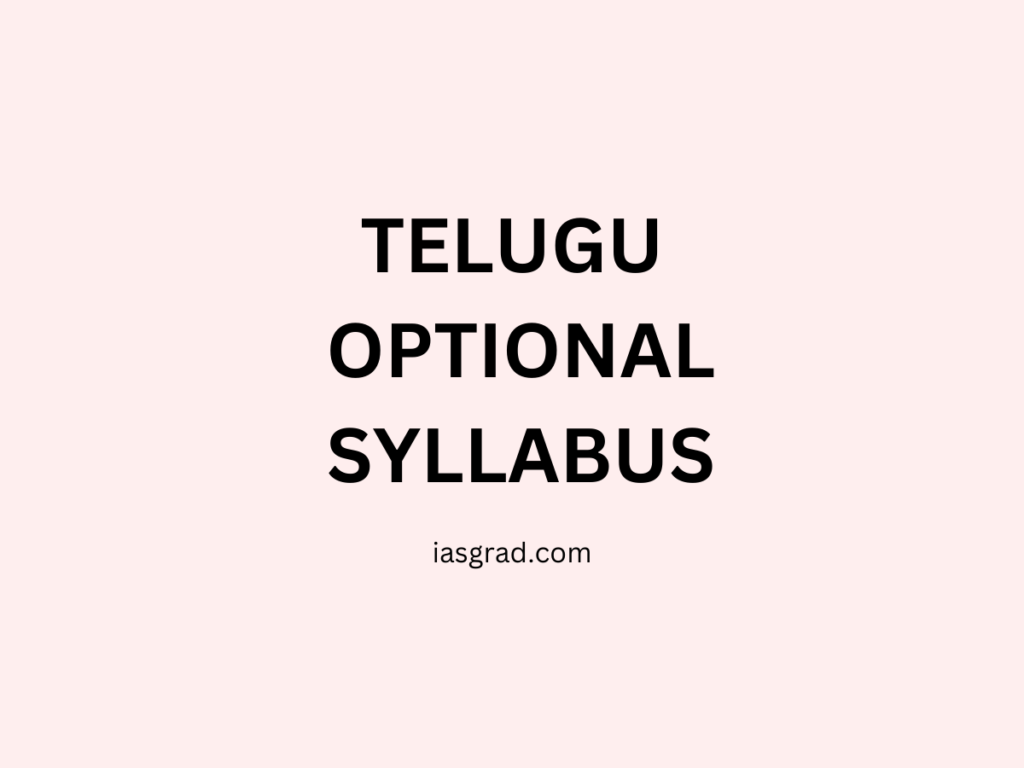Telugu Optional Syllabus
The Telugu Optional for the UPSC Civil Services Exam is an ideal choice for candidates with a solid understanding of the Telugu language and its literary traditions. The syllabus covers the evolution of Telugu as a language, its grammar, and a comprehensive study of classical and modern Telugu literary works, including poetry, prose, and drama. This option allows candidates to immerse themselves in the rich cultural and literary heritage of Andhra Pradesh and Telangana. This post provides a detailed breakdown of the syllabus.
Paper I: Telugu Optional Syllabus
-
Section A:
- Place of Telugu among Dravidian languages and its antiquity—Etymological History of Telugu,Tenugu and Andhra.
- Major linguistic changes in phonological, morphological, grammatical and syntactical levels, from ProtoDravidian to old Telugu and from old Telugu to Modern Telugu.
- Evolution of spoken Telugu when compared to classical Telugu-Formal and functional view of Telugu language.
- Influence of other languages and its impact on Telugu.
- Modernization of Telugu language :
Linguistic and literary movements and their role in modernization of Telugu.
Role of media in modernization of Telugu (News-papers, Radio, TV etc.)
Problems of terminology and mechanisms in coining new terms in Telugu in various discourses including scientific and technical. - Dialects of Telugu—Regional and social variations and problems of Standardization.
- Syntax—Major divisions of Telugu sentences—simple, complex and compound sentences—Noun and verb predications—Processes of nominalization and relativization—Direct and indirect reporting-conversion processes.
- Translation—Problems of translation, cultural, social and idiomatic—Methods of translation — Approaches to translation—Literary and other kinds of translation—Various uses of translation.
-
Section B:
- Literature in Pre-Nannaya Period—Marga and Desi poetry.
- Nannaya Period—Historical and literary background of Andhra Mahabharata.
- Saiva poets and their contribution—Dwipada, Sataka, Ragada, Udaharana.
- Tikkana and his place in Telugu literature.
- Errana and his literary works—Nachana Somana and his new approach to poetry.
- Srinatha and Potana—Their works and contribution.
- Bhakti poets in Telugu literature—Tallapaka Annamayya, ramadasu, tyagayya.
- Evolution of prabandhas—Kavya and prabandha.
- Southern school of Telugu literature-raghunatha Nayaka, chemakura vankatakavi and women poets Literary forms like yakshagana, prose and padakavita.
- Modern Telugu Literature and literary forms—Novel, Short Story, Drama, Playlet and poetic forms.
- Literary Movements : Reformation, Nationalism, Neo-classisicism, Romanticism and Progressive, Revolutionary movements.
- Digambarakavulu, feminist and dalit Literature.
- Main divisions of folk literature—Performing folk arts.
Paper II: Telugu Optional Syllabus
-
Section A:
- Nannaya-Dushyanta Chritra (Adiparva 4th Canto verses 5—109).
- Tikkana-Sri Krishna Rayabaramu (Udyoga parva-3rd Canto verses 1—144).
- Srinath-Guna Nidhi Katha (Kasikhandam, 4th Canto, verses 76—133).
- Pingali Surana-sugatri Salinulakatha (Kalapurno-dayamu 4 Canto verses, 60—142).
- Molla-Ramayanamu (Balakanda including avatarika).
- Kasula Purushothama Kavi—Andhra Nayaka Satakamu.
-
Section B:
- Gurajada Appa Rao—Animutyalu (Short stories).
- Viswanatha Satyanarayana—Andhra prasasti.
- Devulapalli Krishna Sastry—Krishnapaksham (excluding Uravsi and Pravasam).
- Sri Sri-Maha prastanam.
- Jashuva-Gabbilam (Part I).
- C. Narayana Reddy—Karpuravasanta rayalu.
- Kanuparti Varalakshmamma—Sarada lekhalu (Part I).
- Atreya—N.G.O.
- Racha Konda Viswanatha Sastry—Alpajaeevi.
